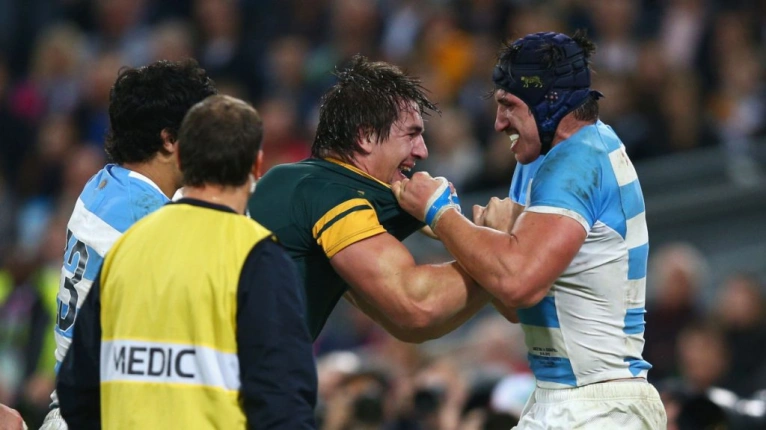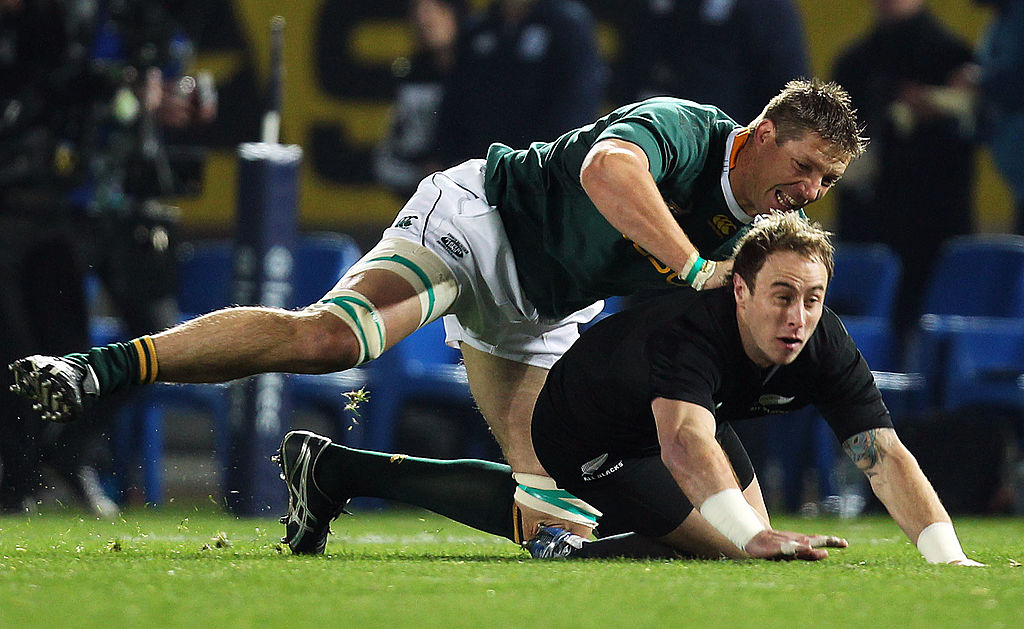27 May 2006. Fog covers the city of Christchurch on New Zealand’s South Island. The Bulls from Pretoria are in town to play the Crusaders in the Super 14 semi-final. Sight is limited. Wynand Olivier takes a late hit he never saw coming.
The Viking Berserker that is Bakkies Botha asks who the culprit in red is. Olivier points to Corey Flynn. At the next scrum Botha, from the second row, clatters Flynn in the face, leaving the hooker prone on the ground.
This story was told by Olivier himself in a wide-ranging podcast with host Ben Karpinski who laughs the whole way through. The moral of this particular anecdote, clipped up for social media, is that the Bulls’ collective spirit saw them through tough moments together. That an attack on one was seen as an attack on all. That under Botha’s watch, no bad deed would go unpunished.
The Bulls lost that match 35-15 with the Crusaders then beating the Hurricanes 19-12 in a final famous for its fog. But the Bulls would bounce back, claiming three of the next four Super Rugby titles in the most successful run of any South African club. Perhaps it was their sense of unity that drove them towards greatness.
That’s the story, and to be fair to Olivier it’s a good yarn, one told a hundred different ways by former pros. But it left me feeling a little uncomfortable.
I can already see the comments. That I’m soft, that I don’t have the minerals to enjoy the dark arts, that rugby would be better if the tofu-eating wokerati would just leave it alone. But let’s call it for what it is; Olivier, a 38-Test Springbok and a Bulls legend, is celebrating thuggery.
Flynn was defenceless at hooker. His arms were wrapped behind the meaty backs of two props and his head would have been facing down. Botha, one of the hardest men in the game, chose to throw a blind-sided cheap shot.
A year later Botha did it again. His victim this time was the England prop Matt Stevens. As told by former Springboks captain John Smit, Botha couldn’t get his head around why Stevens, born in Durban, had chosen to represent the old enemy. Across multiple scrums, Botha landed punches on Stevens’ face, cutting him open and leaving permanent scars.
Smit loves this story. He tells it with such glee, reminiscing how he was unable to control his enforcer’s rage. Stevens has spoken of the incident too, offering awkward shrugs and chuckles.
This isn’t a hit piece against Botha, or against Smith or Olivier. Rugby is rife with this sort of stuff. Just last week the former Welsh No.8 Andy Powell was recounting a famous battle with Botha on a podcast. In his role as a pundit, Christ Ashton regularly has to recall the time Manu Tuilagi repeatedly punched him during the 2011 Premiership semi-final. Admittedly, Ashton had just shoved Tuilagi in the back of the head, but this was in response to a clothesline that almost took his head off.
Am I getting soft? Maybe so. I remember screaming “HOOK HIM!” at my first rugby match, hoping I’d see a knockout worthy of Madison Square Garden. My mom would often say, “If they can’t win the match they should at least win the fight.” I learned very early on that rugby is violent. That the players are warriors, soldiers, gladiators. That its savagery is one of its major pulls.
 Eben Etzebeth of South Africa clashes with Matias Moroni and Tomas Lavanini of Argentina during the 2015 Rugby World Cup Bronze Final match between South Africa and Argentina (Photo by Paul Gilham/Getty Images)
Eben Etzebeth of South Africa clashes with Matias Moroni and Tomas Lavanini of Argentina during the 2015 Rugby World Cup Bronze Final match between South Africa and Argentina (Photo by Paul Gilham/Getty Images)
Watching old clips it’s easy to see why we talk about rugby in this manner. It’s not just because war analogies are easily grasped in all sports, or that rugby is an extremely physical game. The sport was an utter mess not long ago.
Scrums began with run-ups. Rucks resembled Hieronymus Bosch paintings. When fists found faces the referee didn’t even award a penalty. Players simply got on with it. It’s why we remember the Battle of Ballymore in 1989 and the 99 Call in 1974 with such fondness. But, crucially, if those punch-ups took place today they would spark diplomatic incidents.
Here comes the caveat. Of course I’m enamoured with all of the above. These stories are woven into the fabric of the game. I’ve watched every documentary and listened to every podcast I can on these subjects. The algorithm doesn’t lie. Clearly, I’m gagging for more violence.
However, they belong in the past. It is a good thing that this sort of behaviour is no longer acceptable. The game has never been better. The rugby that is played now looks like it came down from a different universe compared to what was once served.
It is also safer. Players are better protected by the law and by a wider acceptance that some lines shouldn’t be crossed. Would the same people who celebrate Botha’s thuggery accept it if Eben Etzebeth replicated that behaviour? Would we feel OK if one day Siya Kolisi shares stories of the time his good friend fired cheap shots on a defenceless opponent?
There is a danger in celebrating illegal violence on a rugby field. When we do so we run the risk of blurring the lines between a bone-shuddering tackle and a dirty punch to the face.
Rugby doesn’t need cheap shots to prove how tough it is. The game’s brutality is baked into every tackle and carry. The real hard men don’t swing in the dark. They show up, week after week, and hit legally, front on, with everyone watching.
